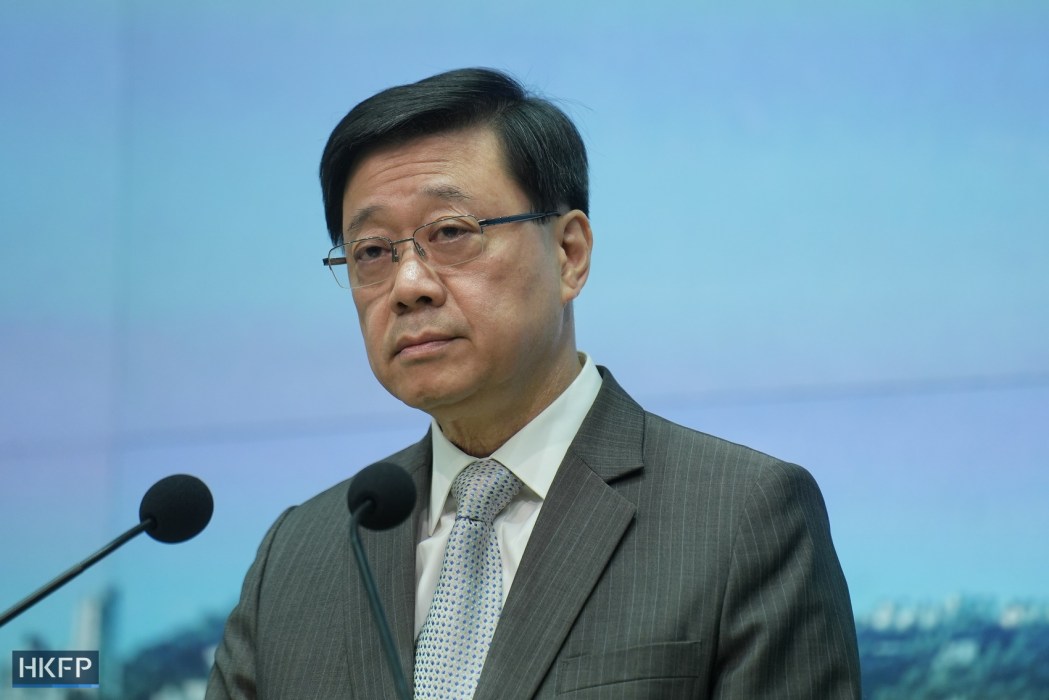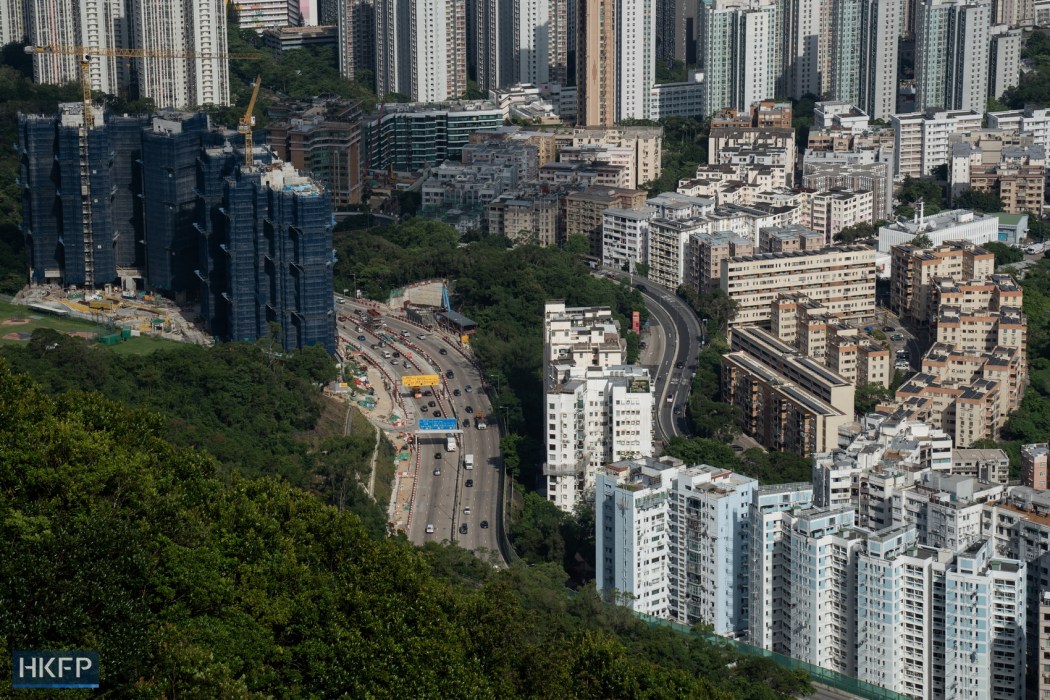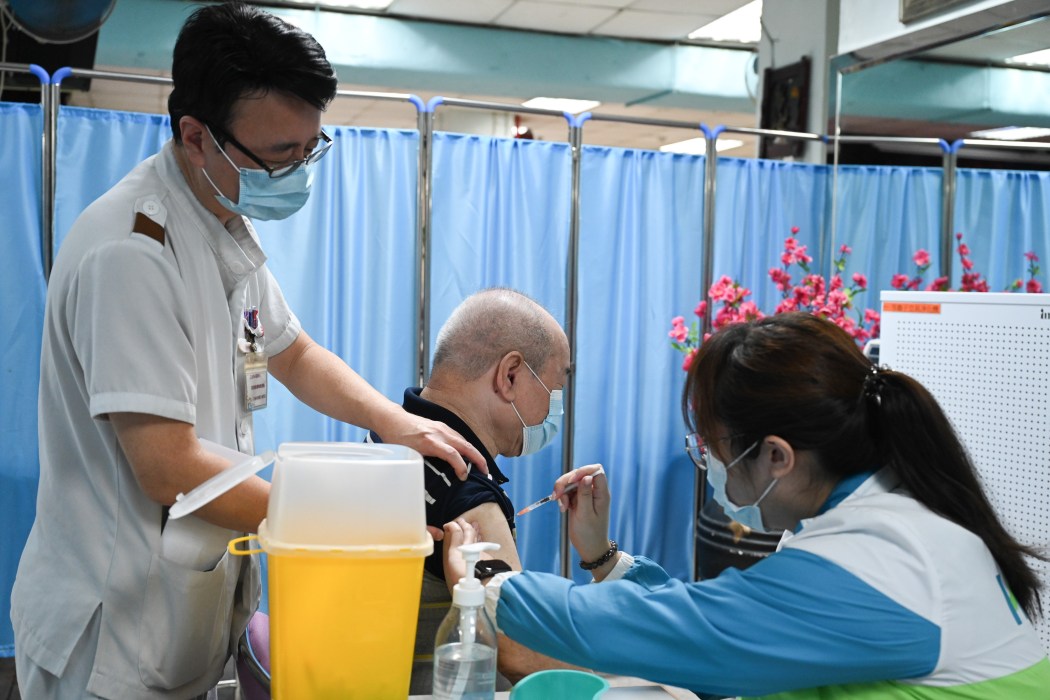Ahead of Chief Executive John Lee’s second Policy Address on Wednesday, when he will lay out measures for the years ahead, local media has been busy reporting on what it might contain.
While the city has said goodbye to stringent Covid-19 rules since last year’s address, the economic outlook remains weak, the birth rate is low, and sectors from construction to education face serious manpower shortages.

HKFP rounds up some of the anticipated policy proposals, many of them leaked to Chinese-language outlets by unnamed sources, that could seek to address some of the issues facing Hong Kong.
Property measures
The chief executive is expected to announce measures to revive Hong Kong’s real estate market, which has seen property prices falling continuously between May and August.
Demands for the government to ease market-cooling measures were raised by politicians and businessmen in recent months, with the Real Estate Developers Association of Hong Kong calling for a full scrapping of market regulation measures.
Citing sources, local newspaper Sing Tao reported on Thursday that it would be unlikely for the government to lift market curbs, including the buyer’s stamp duty, the ad valorem stamp duty and special stamp duty, all at once.

Offering a “deferred payment” to incoming professionals who purchase property in Hong Kong and reducing stamp duty for those buying a second property was more probable, the news report read.
Hong Kong’s residential market “lost its momentum” last year due to continuous interest rate hikes and weaker market sentiment, which stemmed from economic uncertainty and the fifth wave of Covid-19 infections, the Rating and Valuation Department said in the 2023 Hong Kong Property Review issued in April.
Real estate firm Jones Lang LaSalle reported on Thursday that mass home prices “lost all the gains” last month, while the overall transaction volume dipped to its lowest level this year.
Hong Kong saw more than 20,000 unsold flats in newly launched private residential properties in the third quarter this year, the most in almost two decades, according to a report published by Centaline Property Research on Thursday.
Yeung Ming-yee, senior associate director at the research branch of the city’s leading real estate agent, described the 20,483 unsold flats as indicative of a “dangerous” situation. The sales performance of newly-launched flats was not ideal due to interest rate hikes and falling property prices, Yeung said.

The researcher forecast that the number of unsold flats may continue to rise in the next quarter, amid the city’s economic slowdown and adjustments in the real estate market.
“The situation of accumulated inventory in the primary property market is gradually worsening and caution is warranted,” Yeung wrote.
Childbirth
Lee’s administration is seeking to encourage more Hongkongers to have children by offering monetary incentives to couples, local media reported on Thursday. The potential handout came as the city’s birth rate slumped to the lowest in the world according to a United Nations Population Fund report released in April.
Each new-born may receive HK$20,000 from the government if at least one of the parents is a permanent resident of Hong Kong, sources told HK01, the first outlet to report on the possible handout.

Aside from a one-off subsidy, the government’s “multi-pronged” approach to raise the fertility rate may also include expanding the child tax exemption and prioritising families with newborn children when allocating public housing, local media reported.
Financial minister Paul Chan announced in the annual budget in February that the basic child allowance for each child and the additional child allowance for each child born during the year of assessment would be raised from HK$120,000 to HK$130,000.
The Hong Kong Economic Journal (HKEJ) reported on Thursday citing sources that there was room for further increase in the tax exemption.
Hong Kong currently offers several priority schemes to younger families who take care of their elderly parents or dependent relatives. Under the Harmonious Families Priority Scheme, for instance, their applications for public rental housing are processed six months earlier than those made by ordinary families.
The government also sets aside more subsidised flats to sale to those with elderly family members under the Priority Scheme for Families with Elderly Members.
Similar schemes may be announced in the upcoming Policy Address favouring families with children, HKEJ reported.
Chou Kee-lee, chair professor of social policy at the Education University of Hong Kong said on RTHK on Friday that a one-off subsidy may have limited impact on couples when deciding whether to have children, as it involved long-term planning and investment.
Similar cash incentives implemented in other regions did not significantly improve the birth rate, the scholar said. Major policy changes would be needed to motivate childbirth, such as an education reform and introduction of family-friendly measures, he said.
In July, the chief executive said the government was conducting an internal study on ways to promote childbirth in the city. Many countries offered economic impetus to couples, but the effectiveness did not necessarily meet expectations, he said.

A five-yearly report released by the Family Planning Association in Hong Kong in August found that the number of couples without children had overtaken one-child families in the city.
The average number of children per woman plunged to a record low of 0.9. The figure stood at 3.3 in 1972, the association said.
Labour and welfare minister Chris Sun told lawmakers in February that the decision to have a child depended on various factors, such as personal preference, lifestyle, and economic and social situations.
While the government had rolled out policies to build a supportive environment for childbearing and sought to provide better support for couples who wanted children, it should “avoid excessive intervention,” the official said.
Medical voucher coverage expanded
Elderly residents in Hong Kong may be able to use healthcare vouchers in more hospitals in mainland China, as the government may expand their coverage to include up to five medical facilities in the Greater Bay Area.

Sources told local media the upcoming Policy Address would include new service providers for the scheme which provides HK$2,000 vouchers annually to those aged 65 or above.
The new facilities would be top-tier hospitals – also known as Grade 3A hospitals – located in the Greater Bay Area, HK01 reported on Tuesday citing sources.
According to insurance firm Prudential, there were around 3,275 Grade Three hospitals nationwide in China. State media Xinhua reported in 2012 that Grade Three hospitals had the highest medical standards and the best services, as well as the most advanced equipment and more resources for research projects.
At present, the University of Hong Kong – Shenzhen Hospital and its designated clinics or departments are the only facilities in mainland China covered by the voucher scheme.
The hospital, which began operating in 2012, started to accept Hong Kong’s medical vouchers as payment for outpatient services under a pilot programme in October 2015, becoming policy in June 2019.

HK01 reported on Tuesday that the government was expected to roll out a set of cross-border service standards. The voucher use expansion would require complex administrative work, making it difficult for the Hong Kong government to expand the voucher scheme to a larger number of Grade 3A hospitals.
Attracting more non-local uni students
Lee’s administration, which has sought to build Hong Kong as an international tertiary education hub, may raise the ceiling on the number of non-local students admitted by eight government-funded universities, local media reported citing sources.
Sing Tao reported on Tuesday that the intake of non-local students is expected to rise from 20 per cent to 40 per cent of the local intake. It means that local universities may admit up to 6,000 non-local students instead of 3,000 a year, calculated based on the existing 15,000 first-year-first-degree places funded by the University Grants Committee.

Over 70 per cent of the non-local student population in 2022-23 came from mainland China, data from the Census and Statistics Department showed, the highest proportion since 2016.
Raising the ceiling of non-local students would not affect local intake, education sector lawmaker Chu Kwok-keung told HKFP on Tuesday.
He said that due to population decline in the city, many local universities were facing fewer admissions. The public should understand that increasing the admission quota of non-local students did not mean reducing opportunities for local students to enrol in degree programmes, Chu added.
The drop in the number of local students would also reduce the slots originally allocated to non-local students, he said.

“Rather, [raising the ceiling] allows non-local students who were previously eligible for admission to still have the opportunity to study in Hong Kong and potentially contribute as local talent in the future,” he said.
The chief executive visited the Hong Kong University of Science and Technology last month and met with exchange students and non-local postgraduate students. In a Facebook post shared after the visit, Lee said many of the students enjoyed the education and work environment of Hong Kong, with quite a number of them planning to remain in the city after graduation.
The city’s leader said the visit made him believe that Hong Kong had an excellent educational infrastructure, globally renowned universities and outstanding scientific research talent, which were all favourable for building the city as an international hub for higher education.
“My team and I will carefully study how Hong Kong can fully leverage its stable foundation, unique position under One Country, Two Systems, internationalisation, and diversity advantages to attract outstanding talents from around the world in a comprehensive manner,” Lee’s post read.
Support HKFP | Policies & Ethics | Error/typo? | Contact Us | Newsletter | Transparency & Annual Report | Apps
Help safeguard press freedom & keep HKFP free for all readers by supporting our team

LATEST FROM HKFP
HKFP has an impartial stance, transparent funding, and balanced coverage guided by an Ethics Code and Corrections Policy.
Support press freedom & help us surpass 1,000 monthly Patrons: 100% independent, governed by an ethics code & not-for-profit.










